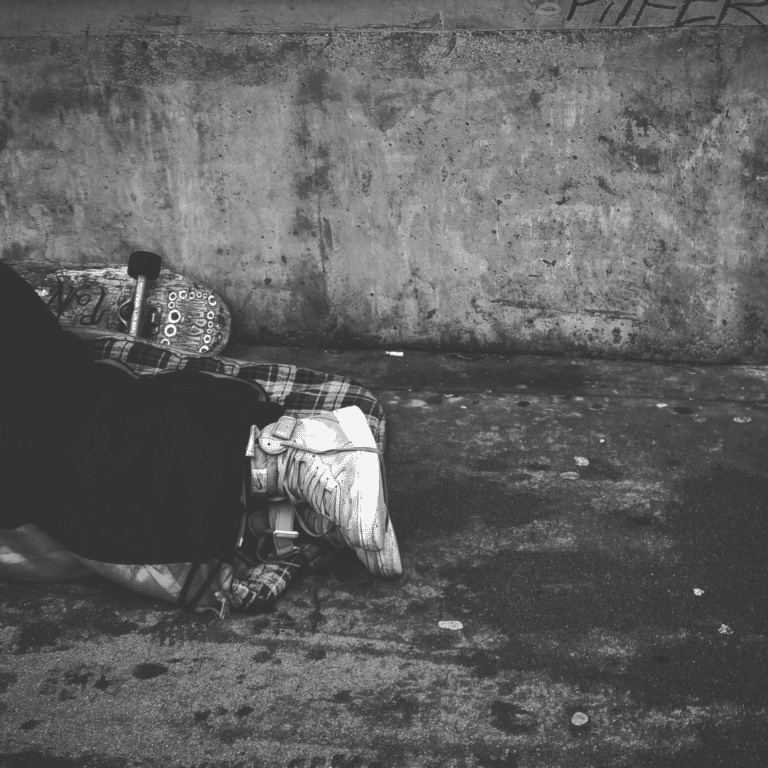Homelessness and drug addiction often go hand in hand. Sadly, many people struggling with both issues can’t get the help they need. A substance use disorder can develop because of the stress involved with being homeless. Unfortunately, many of these people also have psychiatric disorders that further complicate their situation. Seeking treatment would be beneficial, but many homeless drug users don’t know where or how to get help. Without treatment, they continue to be stuck in this cycle of homelessness and addiction. Not only does this situation affect the individual, but it impacts the entire community by putting public health at risk, increasing incarceration costs, and creating loss of tourism and economic growth. 
Understanding the Connection
The relationship between homelessness and drug addiction is complex. For many individuals, their drug use is a result of their homelessness. They turn to self-medicating in order to cope with their situation. Others find themselves homeless because of their substance use disorders. Breaking the cycle of homelessness and addiction requires proper care and treatment, which isn’t easy for these people to find.
There are several contributing factors to this unfortunate situation.
Mental Health Issues
Mental health issues make it difficult to maintain stable and affordable housing. In severe cases, their mental health can affect their ability to work. Without a regular income, the expense of housing can seem unattainable.
Trauma
Domestic violence is a contributing factor, especially among women and children. Violence triggers homelessness when victims flee their homes without having a solid plan in place. Without a place to live, they end up in shelters, living in their cars, or simply on the street. Staying in a harmful situation doesn’t work either. The longer they stay in a traumatic situation, the more vulnerable they are to homelessness and addiction. Along with physical abuse, the mental anguish of domestic violence can leave one with low self-esteem, making it feel impossible to improve their life.
Lack of Social Support
Without support services for homeless drug users, these people have a hard time trying to break this cycle. They use drugs and alcohol to forget the situation they’re in, which makes it even harder to get back on their feet.
Mental Illness
Having a mental illness makes it challenging to find employment and stable housing. Many of these other contributing factors can lead to mental illness, making this problem even more complicated.
Family Conflict
The LGBTQ+ community is especially vulnerable to this. Coming out to loved ones is hard. Their family may kick them out or make them feel unsafe in their homes. Many young adults who aren’t ready to be on their own, end up in an out-of-control spiral leading to addiction.
According to the National Coalition for the Homeless, 38% of homeless individuals depend on alcohol. In addition, 26% depend on other substances, and 30% are dealing with mental health issues. A lack of affordable housing increases addiction and mental illness. Without enough treatment services available, these people have a difficult time when it comes to breaking the cycle.
Systemic failures add to this cycle. When society doesn’t support people who are at risk of becoming homeless, the problem continues. Areas that let these people down are healthcare services, correctional institutes, and child welfare. Those who do end up in the care of these services are often let down. They are released from jail and hospitals before they are fully prepared to return to their community. When society fails to address issues like wages, racial inequality, and affordable housing, homelessness and addiction rise.
Causes and Challenges
There are many challenges faced by homeless addicts, as well as those on the verge of losing their homes. Unemployment is a significant factor. After being unemployed for a long time, it’s easy to slip into homelessness. Without a reliable income, one can’t make their monthly rent or mortgage payment. This leads to eviction. Once an individual is on the streets, it can seem impossible to find a job. The majority of homeless people want to work but can’t because they don’t have a permanent address.
The cost of living continues to rise. Unfortunately, wages haven’t gone up at the same rate. This makes covering everyday expenses a challenge. It’s impossible to plan ahead for unexpected emergencies once an individual reaches this point. One unexpected accident, injury, or illness can wipe out what money they do have. As a result, there’s no money left over for housing. Once they find themselves without a home, they quickly become trapped in poverty as it becomes more difficult to hold a job, save money, or overcome obstacles such as addiction.
For families, this becomes a greater challenge. Families are put into shelters or low-income housing, which makes them more visible to social services. If a parent is suffering from a substance use disorder, they are often reported and become separated from their children. Others face criminal charges and are incarcerated, which also leads to losing their children. This isn’t an ideal situation for anyone involved, as the adults continue to turn to drugs and alcohol for comfort, making it harder to get their children back.
Another problem is a lack of money and assistance with health care. Many people are uninsured or don’t have enough coverage because they can’t afford it. Seeking health care results in struggling to buy food, pay rent, or pay their utilities. Rather than face homelessness, they neglect checkups and avoid substance use treatment programs.
The Impact of Homelessness and Addiction on Individuals and Communities
The impact of addiction on homelessness affects everyone in their community. Homeless addicts are more likely to commit crimes as well as become victims of crime. The crimes are typically nonviolent, such as theft and burglary.
Crimes like sleeping in public places, panhandling, loitering, and sidewalk sitting lead to incarceration. Not only do homeless addicts engage in these activities more often, but they’re also more likely to be policed for them.
Health disparities among the homeless have long-term effects on their health and well-being. These individuals face barriers when it comes to getting healthcare. They don’t have access to transportation, insurance, or identification. This is unfortunate because their homelessness leaves them vulnerable to impaired immune systems.
Those who rely on mainstream services for help, such as hospitals, emergency rooms, the criminal justice system, child welfare, and income support, put a strain on the community. The cost of providing these services increases as the rate of homelessness and addiction rises. It becomes a burden on society.
There’s a great need for comprehensive solutions to address these intertwined issues. Many homeless individuals with substance use disorders don’t know where to go for help. Even if there are programs available, they may not think they have the resources to get help.
Solutions and Interventions
- The housing first approach is an assistance program that makes finding permanent housing for these individuals a top priority. Ending their homelessness allows them to improve their quality of life and seek help for addiction.
- Harm reduction strategies reduce the harmful effects of substance abuse disorder on the individual, their community, and society.
- Solutions for homelessness and drug addiction can be found by contacting the Substance Abuse and Mental Health Services Administration.
- Supportive services and resources combine affordable housing with other services to help individuals with chronic physical and mental health care. It’s a highly effective strategy for getting people off the streets and into the care programs they need.
Supportive Services and Resources
- Shelters provide people with the basic necessities. This includes food, shelter, and clothing. This allows them to maintain their health and well-being while reducing the risk of injury or illness.
- Outreach programs help connect homeless people with mental health and addiction issues by finding them the treatment they need.
- Addiction treatment centers like Liberty Bay Recovery Center offer inpatient drug and alcohol detox programs in a supportive and secure environment. We provide the necessary support needed to manage withdrawal symptoms and start a road to recovery.
- Mental health services such as counseling and therapy are extremely beneficial. These publicly sponsored programs specialize in assisting homeless individuals with co-occurring disorders. Tackling the base problem is a great way to begin recovery.
- Peer support groups offer much-needed support. Those experiencing homelessness and addiction typically feel isolated. These groups provide them with a place where they can talk with others who have experienced similar situations.
Overcoming the Challenges of Homelessness and Addiction
The impact of addiction and homelessness affects us all. It’s a never-ending cycle for many people who have found themselves on the streets with no place to go. They often don’t realize that help is available. The result is a constant battle between self medicating and finding a place to live.
There are ways in which you can help with the challenges faced by homeless addicts. Promote your nearby shelters and their mission. Make small cards with the shelter’s information on them to pass out to those in need. Donate clothing to those shelters. Or volunteer your time. Shelters and other helpful organizations can always use help. You could even organize a fundraiser. Take advantage of online fundraising tools such as GoFundMe or try a traditional method like hosting a bake sale.
If you or someone you love is homeless and dealing with an addiction, utilize these resources. As a community, we also need to advocate for funding to continue and provide access to these programs. Addressing homelessness and addiction together can help many of these individuals improve the quality of their lives and become contributing citizens within their community and family.






